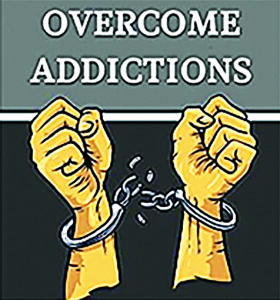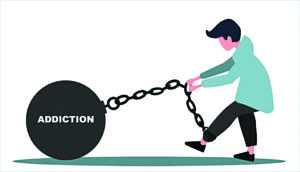 In the shadows of society’s ever-evolving landscape lies a formidable adversary: Substance Addiction. This psychological labyrinth extends its tendrils into countless lives, leaving a trail of broken dreams and strained relationships.
In the shadows of society’s ever-evolving landscape lies a formidable adversary: Substance Addiction. This psychological labyrinth extends its tendrils into countless lives, leaving a trail of broken dreams and strained relationships.
Substance addiction is a complex and multifaceted psychological phenomenon that affects millions, worldwide. There is a strong need for the understanding of the intricate interplay of biological, psychological and social factors. This is crucial in comprehending the origins, development and treatment of substance addiction.
Understanding addiction is like navigating through a treacherous maze with a deceptively alluring treasure at its heart – like being drawn into this labyrinth by promises of immediate rewards and euphoria. Initially, as you venture further into the maze, the path seems harmless and even exciting. The twists and turns trigger a surge of anticipation, akin to the initial rush of pleasure from addictive substances.
However, as you progress deeper, the walls of the maze start to close in, much like addiction’s tightening grip on your life. The once-thrilling journey turns into a confusing maze of cravings, withdrawals, and negative consequences. The treasure you sought, which once held the promise of happiness, now seems elusive, surrounded by walls of despair. Each time you attempt to turn back and escape the maze, you’re met with intense discomfort, much like the physical and emotional struggles of overcoming addiction. The treasure’s pull remains strong, and you find yourself drawn back into the intricate pathways that seem impossible to navigate.
Breaking free from addiction is like finding a hidden key within the maze. This key represents a mix of support, coping strategies, and treatment that psychologists and professionals provide. With this key, you gain the tools to unlock the chains of addiction, helping you manoeuvre through the labyrinth and regain control over your life.

How Addiction Works…
Think of the brain like a control centre that manages how you feel and react to things. When something good happens, like when you eat your favourite food or spend time with friends, the brain sends out a ‘feel-good’ signal, called dopamine. This signal makes you feel happy and satisfied.
Now, imagine there’s a special path in your brain, like a highway, that carries this feel-good signal. We call it the ‘reward pathway’. It’s like a system that’s meant to make you remember the good stuff and want to do it again. But when people start using addictive things, like drugs or alcohol, they trick this reward pathway. These substances make the brain send out more dopamine than normal – it’s like getting a super-sized dose of happiness. This feels amazing at first.
But here’s the tricky part – because the brain gets this huge happiness blast, it starts to think that it needs more of the addictive stuff to feel good again. It’s like your brain becomes greedy for that extra happiness. So, the brain adjusts itself by making less dopamine on its own. This causes a problem. Now, you need more and more of the addictive stuff just to feel as happy as you’re used to feeling. It’s like you’ve built a tolerance to happiness.
You try to stop using the addictive element, but your brain doesn’t make enough dopamine anymore. This brings you down. It’s like your brain is protesting because it’s used to getting that extra happiness from the addictive substance. This vicious cycle keeps repeating – making the addiction so tough to break. Now your brain needs the addictive element just to feel ‘normal’!
Understanding this can help you see why quitting an addiction is not just about willpower. It’s about rewiring your brain and finding new, healthy ways to feel good. And that’s where treatments and support from psychologists and other professionals come in – these guide and help you break free from this cycle and finding happiness in healthier ways.
Psychological Factors
Individual susceptibility to substance addiction varies greatly, influenced by a combination of genetic predisposition, personality traits, and mental health factors. Certain individuals possess higher genetic vulnerability to addiction due to inherited differences in how their bodies metabolize substances. Additionally, psychological traits like impulsivity, sensation-seeking, and a history of trauma have been linked to an increased risk of substance abuse.
Underlying emotional and psychological issues often play a significant role in the development of addiction. Many individuals turn to substances as a way to cope with stress, anxiety, depression, or past trauma. This self-medication can create a reinforcing cycle, where the temporary relief offered by substances reinforces their continued use, despite the negative consequences.
Social and Environmental Factors
The environment in which an individual grows and lives also contributes to the likelihood of addiction. Peer pressure, family dynamics, and cultural norms can all impact an individual’s attitudes toward substance use. Availability and accessibility of substances plays a crucial – living in an environment where drugs or alcohol are readily accessible increases the risk of experimentation and subsequent addiction.
Treatment Approaches
Psychological interventions are central to the treatment of substance addiction. Cognitive-Behavioural Therapy (CBT) is widely used to help individuals identify and modify the thoughts and behaviours that contribute to their addiction. By addressing maladaptive beliefs and teaching coping skills, CBT equips individuals with the tools to resist cravings and manage triggers.
Motivational interviewing is another effective approach, focusing on enhancing an individual’s intrinsic motivation to change. This client-centered therapy encourages self-exploration and self-efficacy, fostering a commitment to recovery. For those with severe addiction, medication-assisted treatment can be beneficial in helping manage withdrawal symptoms, reduce cravings, enabling individuals to engage more effectively in therapy.
Prevention and Education
Preventing substance addiction involves not only treating those already affected but also implementing preventive strategies. Education plays a pivotal role, particularly in schools and communities, where individuals can be educated about the risks and consequences of substance abuse. Teaching coping skills, stress management, and healthy ways of dealing with emotions equips individuals with tools to navigate life’s challenges without turning to substances.
Substance addiction, viewed through the lens of psychology, reveals a complex interplay of biological, psychological, and social factors. Understanding the neurobiological mechanisms that underlie addiction, recognizing the role of psychological traits, addressing emotional issues, and utilizing evidence-based therapies are all essential components of effective addiction treatment. By continuously advancing our knowledge of addiction we can empower individuals to overcome the grips of substance addiction and lead healthier, fulfilling lives.
- Understanding Attachment Styles And Their Impact on Relationships - 27 April2024
- Managing Relationship Stress - 13 April2024
- Prioritizing Mental Health: A Year-Round Commitment - 16 March2024
